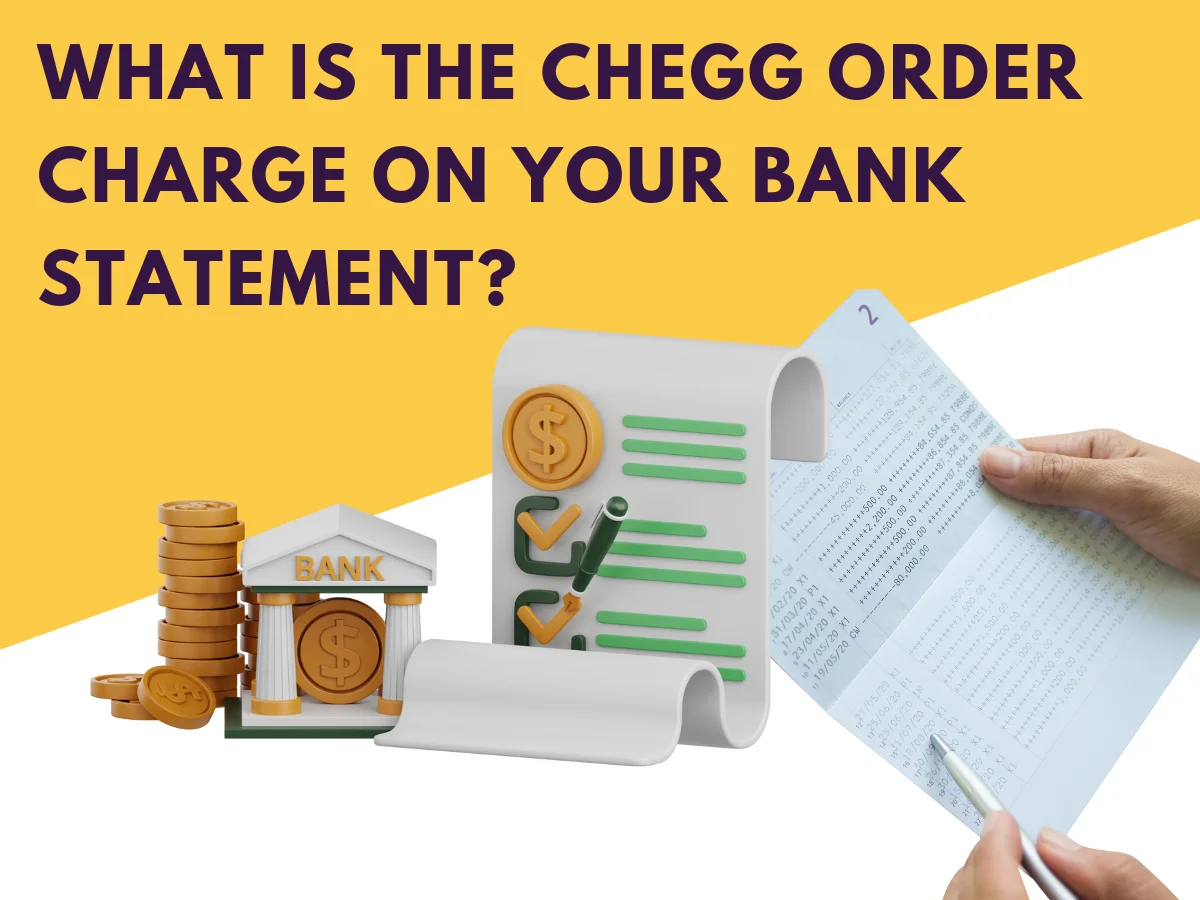In the ever-evolving landscape of online transactions, the appearance of an enigmatic entry like “Chegg Order” on your bank statement can prompt curiosity and concern. Let’s embark on a journey to unravel the mystery behind this seemingly cryptic charge, shedding light on what it means and why it might show up on your financial records.
Also read CRO Charge on Bank Statement.
What is a Chegg charge?
To comprehend the Chegg Order charge, we must first understand Chegg itself. As an educational technology powerhouse, Chegg is synonymous with services like textbook rentals, online tutoring, and an extensive array of study resources. Consequently, a “Chegg Order” on your bank statement is a broad indicator that you’ve engaged in a transaction with Chegg, involving activities such as renting textbooks, subscribing to study resources, or accessing their online tutoring services.

Can I dispute a Chegg charge?
Addressing a common concern among consumers, disputing a Chegg charge is within your rights. Whether the charge is unauthorized or erroneous, you can dispute it with your bank or credit card issuer. This safeguard ensures the integrity and security of your financial transactions, offering peace of mind in your interactions with Chegg.
What Is the Chegg Order Charge?
Delving deeper into the essence of the Chegg Order charge, it clearly indicates a transaction related to Chegg’s expansive educational services. Whether you’ve rented a textbook for an upcoming course, subscribed to their comprehensive study resources, or participated in enlightening online tutoring sessions, the Chegg Order charge is a testament to your legitimate engagement with Chegg’s offerings.
What Does the Chegg Order Charge Look Like?
Identifying the Chegg Order charge on your bank statement may require a keen eye, as it can manifest in various forms. Here’s a breakdown of possible entries:
- Chegg Order
- CHGG*Order
- Chegg Inc Order
- CHGG*Customer Service
- Chegg Services
- CHGG.COM
- Chegg Study
- CHGG*Subscription
These entries differ slightly depending on your bank’s formatting. However, they generally incorporate variations of “Chegg” or “CHGG,” coupled with descriptors such as “Order,” “Subscription,” or “Customer Service.”
Why was I charged?
Let’s break down the reasons why you might have been charged by Chegg into concise points:
- Textbook Rentals:
- Renting textbooks for specific courses is a common reason for a Chegg charge. The company offers a textbook rental service, allowing students to access required course materials without the need for a full purchase.
- Study Resource Subscriptions:
- Subscribing to Chegg’s extensive study resources is another potential cause for the charge. Chegg provides many study materials, including solutions manuals, practice problems, and more, to aid students in their academic pursuits.
- Online Tutoring Sessions:
- Availing of online tutoring services through Chegg is yet another scenario where a charge may occur. The company offers personalized tutoring sessions, connecting students with experts in various subjects to enhance their understanding and performance.
- Subscription Renewals:
- If you have an ongoing subscription with Chegg, the charge could be related to the renewal of your subscription plan. Chegg offers subscription services for access to a variety of educational resources, and periodic charges may occur based on your subscription terms.
- Additional Services or Add-ons:
- Beyond core services, Chegg may offer additional features or add-ons that could result in charges. Examples include premium study packages, extra tutoring hours, or exclusive content that goes beyond standard subscriptions.
- Customer Service Transactions:
- Engaging with Chegg’s customer service for various reasons, such as account support or dispute resolution, could lead to a transaction on your statement. This ensures that any additional services or assistance provided by Chegg are accounted for.
- Free Trial Expirations:
- If you initially signed up for a free trial of a Chegg service and the trial period has ended, the transition from a free trial to a paid subscription could result in a charge.

How do I stop Chegg from charging my card?
Let’s break down the steps to stop Chegg from charging your card into five concise points:
- Regular Statement Monitoring:
- Regularly review your bank statements to promptly identify any unfamiliar or unauthorized charges related to Chegg. Vigilance is key in ensuring you catch any discrepancies promptly.
- Enhance Online Security:
- Bolster the security of your online accounts, especially with Chegg, by utilizing strong and unique passwords. Ensure that your login credentials are robust to mitigate the risk of unauthorized access.
- Caution in Payment Information Sharing:
- Exercise caution when sharing payment details, allowing transactions only on secure platforms. Be mindful of where and how you input your card information, minimizing the chances of unauthorized charges.
- Update Contact Information:
- Maintain accurate and up-to-date contact details with Chegg. This ensures you receive timely notifications about your account, including transaction confirmations and alerts, allowing you to stay informed about any activity.
- Enable Transaction Alerts:
- Stay in the loop by setting up transaction alerts with your bank. Receive real-time notifications for any activity on your card, empowering you to quickly respond to and investigate any unexpected charges, including those from Chegg.
Implementing these measures collectively reinforces your control over future transactions with Chegg, helping you manage your account securely and minimizing the risk of unauthorized or unexpected charges.
Conclusion
In the labyrinth of online educational services, the Chegg Order charge emerges as a transparent representation of your transactional engagement with Chegg. Armed with a comprehensive understanding of this charge, equipped with the ability to identify it on your statement, and armed with proactive measures to ensure financial security, you can navigate the world of online educational transactions with confidence. Stay informed, stay secure, and enjoy a seamless experience with Chegg’s educational offerings.
